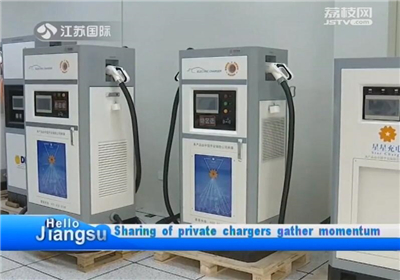The installation of electricity charging stations has become the bottleneck for the rapid development of the emerging new energy vehicle market. Shao Danwei, chairman of Jiangsu Wanbang New Energy Investment Group Company, has targeted the market to launch her brand of electricity chargers to usher in a new stage of development for the charging facilities.
Shao and her team has revolutionized the installation of charging facilities through the sharing of the private chargers which could help divers save a few cents per kilowatt hour due to the use of civil power supply rather than commercial power supply.
In 2014, Shao noticed that the installation of public charging facilities was very slow due to the huge investment on the operation of the chargers, slow return on investment and the inconsistent standards. At the same time, a large number of private charging facilities remained idle. It then occurred to her to launch the sharing program of the private chargers.
She soon quit her job as the CEO of Wanbang Vehicle and launched Wanbang New Energy Group Company with the help of five employees.
She called on the owners of the private charging piles in Changzhou to make room for public use and leave the operation and maintenance to her company with the dividend shared by the concerned parties.
More than 3000 applications were filed shortly after she rolled out her program, which paved the way for her to launch 1400 electric charging piers across Changzhou in three months, equaling the total numbers of charging facilities that had been built in Beijing, Shanghai, Guangzhou and Shenzhen in the past 7 years.
Shao and her Star Charger private charger business is now recording more than 10000 kilowatt hours of electricity consumed with a monthly increase of 30%.
Her company has now hired more than 1000 employees with most of them working as senior executives who had quit their jobs in Beijing and Shanghai.
Star Charger is now spearheading a demonstration project on the installation of high-power charging facilities across the country.
China’s new energy vehicle sector has grown steadily in the past two years due to subsidies and tax cuts.
As a result, China's State Council, the Cabinet, has announced that the country will build a network of 12,000 charging stations to meet the power demands of 5 million electric vehicles by 2020.
In addition to the 12,000 chargers, 4.8 million power poles, 3,850 charging stations for public buses and 2,500 for taxis will be built in the same period.
The State Council has also announced a guideline last week on a nationwide charging network.
According to the guideline, new residential complexes should have charging points or assign space for them, while no less than 10 percent of parking spaces in public parking lots should have charging facilities. There should be at least one public charging station for every 2,000 new energy vehicles, the guideline said.
To finance the project, the government will encourage private investment, allow charger manufacturers to issue corporate bonds, and seek investment from pension funds






